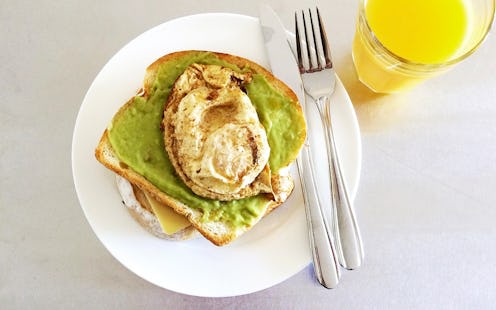Life
Why You Shouldn't Cut Fats From Your Diet Anytime Soon
Let's say you forgo fat for a week: All fats, meaning the healthy ones too. What would happen? Yes, there are low-fat and non-fat diets, but with any — especially one that cuts out an important nutritional factor — can come consequences. So, weird things that happen when you stop eating fat for a longer period of time can pop up, especially when your body is used to getting that average intake each day. So, it's good to know which things are normal, and which are more worrisome in order to keep a healthy, stable diet.
As a certified health coach, I work with clients on keeping a healthy diet, and this includes proper amounts of fats, proteins, and carbs. Fats have their own benefits, such as keeping the body functioning properly, making you fuller longer, and keeping the metabolism strong. Plus, it can taste good. Yet, bad fats, like those in baked or fried foods, should be limited. Still, great, healthy fats, like those in avocados or oily fish, are awesome for fueling the body and filling those fat requirements. Here are 9 things that can happen to your body if you stop eating good fats for a week or more. If you notice any drawbacks to the change, you might want to add some back in.
1. You Might Get Crazy Cravings
If you cut out fats for a substantial amount of time, you might notice you're not as satisfied after meals. When you're left hungry or in need of more texture and substance, you might begin to have cravings throughout the day. If you're hungry AF all day, add in some fats with meals.
2. Your Brain Isn't As Sharp
If you cut out healthy fats, like those found in salmon, nuts, and olive oil, you might not be as mentally alert or have as great a memory retention as usual. Good fats can help in boosting brain health and memory, so if you eliminate it, you might experience more diminished brainpower.
3. You Might Have Higher Cholesterol
While it seems strange, you might have higher cholesterol if you cut out good fats (bad fats, like eating saturated in excess or eating greasy, processed foods can raise your cholesterol too much), explained a Harvard School of Public Health study published in "Public Library of Science Medicine." If you're deficient for a longer time, it might show an upset in levels.
4. Your Heart Might Suffer
According to studies published in the journal Nutrients, there are several cardiovascular benefits to eating healthy fats. If you're not eating enough good fats, you might lose the perks of a lower risk for heart disease and stroke. Going to the doctor after cutting out fat could help you get a better estimate of the consequences.
5. Your Metabolism Might Slow Down
While it might improve from cutting out bad fats, if you stop eating good fats, your metabolism and brown fat burning process might be reduced, explained nutritionist Bobbie Covert, over interview with Distractify. If your metabolism slows, it might also worsen weight management, too.
6. You Might End Up Eating More Carbs Than Your Body Needs
According to Christy Shatlock, RD at bistroMD over email with Bustle, "by severely reducing high quality sources of dietary fats, you are likely to overdo calories from sources of carbohydrates." This excess intake can actually sabotage your health and fitness goals, especially if you are looking to lose weight, Shatlock says.
7. You Might Elevate Your Blood Sugar Levels
Shatlock says that eating too many carbs and not enough fats can prevent stable blood sugar levels, and this can lead to an increase risk of diabetes, as well as a worsened metabolism. To keep levels stable, have a healthy fat with each meal.
8. You Might Have Lower Hormone Levels
If you cut out good fats, you might have "decreased hormone levels, especially testosterone, which can lead to low libido," as well as, "decreased muscle mass which leads to a decrease in metabolic rate, depression," says Jaclyn Jacobsen, nutritionist at The Vitamin Shoppe over email with Bustle. You might also experience lower bone density, as a result, Jacobsen adds.
9. You Might Have Higher Triglycerides
Jacobsen warns that you might experience elevated triglyceride levels, as the liver converts excess sugar into fat (and it's not getting adequate healthy fats to counteract the effects). This can be a precursor to heart disease, heart attack, diabetes, and stroke, Jacobsen adds.
By cutting out fats for a week or more, you might get hit with these nasty side effects. To prevent any damage, discuss the diet change with a physician first.
